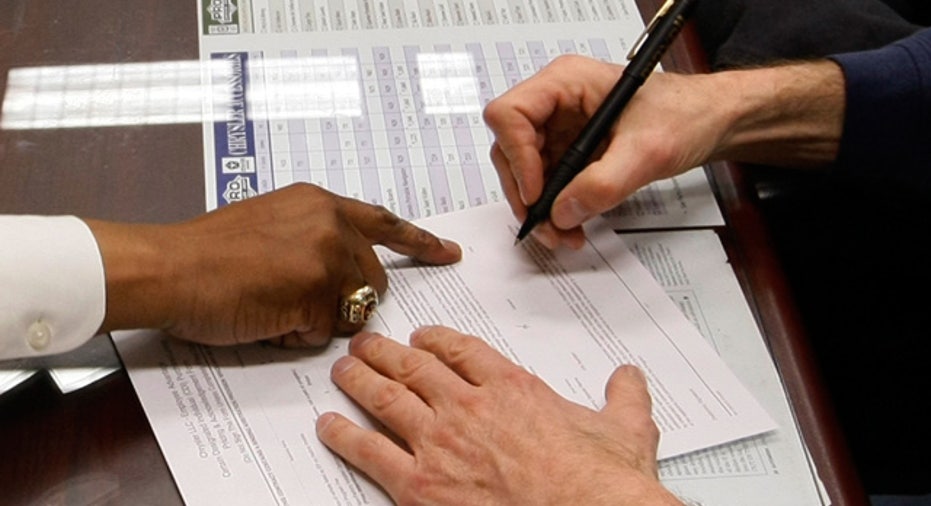How a Friendly Loan can Turn Ugly

Dear To Her Credit,
Two years ago, I applied for a loan to help out a friend to start a new business. I believed in her product, and she agreed to pay the money back in installments toward the credit card company. The amount was $30,000.
The business failed, and the money has been spent. The debt is now double the original amount because of penalties and interest, and the credit card company is after me to make the payments because the loan is in my name.
What are my legal options? What could happen if I am not able to pay the loan back?
- Leah
Dear Leah,
You loaned a friend $30,000. You don't say where your friend is now, or whether she is even willing to pay the money back. I'll assume she is too embarrassed to show her face, and she's left you with the debt.
That's the trouble with lending money to a friend. You usually lose both the money and the friend. It happens more often than you think -- and it often seems to be the borrower who breaks off the friendship.
If you can't pay the debt, the credit card company will step up efforts to make you pay. At first, you just get letters and then possibly a phone call. As time goes by, the interest rate rises, and your $60,000 debt can turn into $120,000 or more before you know it.
Your credit is already suffering with this delinquent account in your name. The credit bureaus don't know or care how you got into debt. As the reports from this credit card company report longer and longer overdue times, your credit score will suffer even more.
Eventually, the credit card company will take legal action against you. It can sue you for nonpayment, seize money in your bank account and garnish your wages. It's serious business.
With a $60,000 debt you can't pay, you're a prime candidate for bankruptcy. Before you head to your nearest lawyer's office, however, you should investigate every possible alternative.
The first place to try to get money is from your friend. She's probably looking at the $60,000 current balance and thinking she can't pay it all back, so why try. She borrowed from you because you were in a better financial position than she was, so maybe she doesn't realize what a difficult spot she's put you in. Some people (not all) who are perennially in financial trouble assume that people with stable finances have an unlimited supply of money. If only it were true!
If you are on speaking terms, talk to her about how she can pay off this debt. She may have to work a second job, sell her car or move back in with her parents or take a roommate. Those are all drastic steps, but she borrowed and spent the money. She should do what it takes to make good on her debt to you.
Another step you can take is to try to negotiate the debt with the credit card company. About half the debt is late fees and interest. Paying back money that has been spent is one thing. Paying $30,000 in interest and late fees is another. Contrary to the ads you may have seen and heard, negotiating debt is not easy or automatic. However, in this case, it's worth a try. See "Credit card debt negotiation in 3 (not) easy steps."
If you cannot get your friend to pay, and the bank does not negotiate enough to make it possible for you to pay off the debt, I'm afraid you'll need to consider bankruptcy. As scary as bankruptcy sounds, it's not as scary as being hounded for a debt that, if ignored, will soon be in the six figures.
Bankruptcy is no walk in the park. It involves paperwork, meetings and time. You lose some control of your money and your credit score tanks.
On the other hand, the bankruptcy courts generally do not take personal items. Depending on the laws in your state, you probably can keep all or most of your other assets, including your car. Bankruptcies are public records, but who sits around reading bankruptcy announcements? Your friends and relatives don't need to know unless you tell them. (If you do tell them, you'll be surprised at how many people admit they've been through bankruptcy themselves!) If you have a steady income, you may be able to file Chapter 13 bankruptcy , which puts you into a payment plan for the next three to five years.
This would be a good time for you to find a nonprofit agency affiliated with the National Foundation for Credit Counseling or the Association of Independent Consumer Credit Counseling Agencies. A credit counselor can look at your total financial picture and help you make the best decisions.
I only recommend bankruptcy in extreme cases, such as medical catastrophe, business failure or a debt run up by someone else. You've experienced two out of three of these events. If you don't take action now, it will only get worse. If you find help and make some tough decisions, however, you can take this as a lesson learned and move on.



















